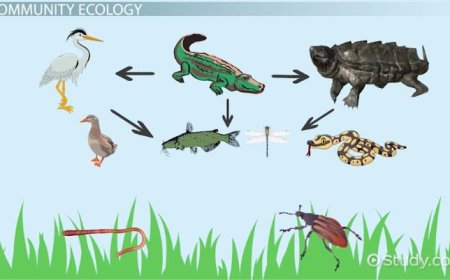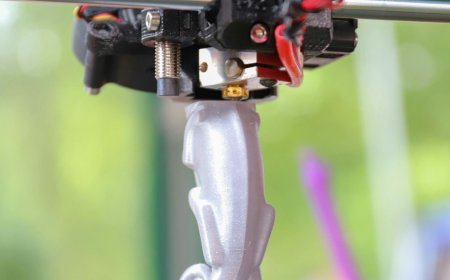How AI Is Revolutionizing Scientific Research
AI is fundamentally transforming scientific research by automating routine tasks, analyzing vast datasets, and generating insights that would otherwise be impossible for humans to achieve within a reasonable timeframe.

Artificial Intelligence (AI) has rapidly transformed various industries, and one of the most exciting and impactful areas is scientific research. From speeding up the process of discovery to solving complex problems, AI is reshaping how scientists conduct experiments, analyze data, and make breakthroughs. In this article, we will explore how AI is revolutionizing scientific research, providing detailed answers to frequently asked questions, and highlighting key examples, future statistics, and facts that underscore AI’s potential in science.
How Is AI Transforming Scientific Research?
AI is fundamentally transforming scientific research by automating routine tasks, analyzing vast datasets, and generating insights that would otherwise be impossible for humans to achieve within a reasonable timeframe. Here’s how:
- Automation of Repetitive Tasks: AI algorithms can handle routine tasks such as data entry, analysis, and even some forms of experiment design. This reduces human error and frees up researchers to focus on higher-level thinking.
- Data Analysis and Interpretation
- : Scientific research often generates enormous amounts of data. AI-powered tools can process and analyze these datasets at an unprecedented speed, revealing patterns and insights that may take researchers years to uncover manually.
- Predictive Modeling: AI can make predictions based on historical data, which helps researchers forecast outcomes, test hypotheses, and make data-driven decisions.
How Can AI Revolutionize Science?
AI has the potential to revolutionize science in several key areas:
- Accelerating Discoveries: With AI's capability to process massive datasets, scientific discoveries are happening faster than ever before. Machine learning algorithms, for instance, can quickly sift through thousands of compounds to identify potential drug candidates, shortening the time needed to develop new treatments.
- New Methods of Research: AI is enabling researchers to approach scientific questions in entirely new ways. For example, AI is being used in genomics to identify gene patterns linked to diseases, allowing for more personalized medicine.
- Enhanced Simulation Capabilities: AI can simulate complex systems, helping scientists model phenomena like climate change, disease progression, and quantum mechanics, which would be difficult or impossible to study in real life.
What Is the Role of Artificial Intelligence in Scientific Research?
AI plays several vital roles in scientific research, including:
- Data Processing and Pattern Recognition: AI algorithms excel at processing complex, multidimensional data and recognizing patterns that might be too intricate for humans to detect.
- Automating Experimentation: AI helps automate repetitive tasks in laboratories, such as testing, measuring, and recording, which increases productivity and accuracy.
- Drug Discovery: AI is being used extensively in drug discovery by predicting how different compounds will interact with targets in the human body, speeding up the process of finding new treatments.
How Artificial Intelligence Is Revolutionizing?
Artificial intelligence is revolutionizing scientific research by enabling faster, more efficient problem-solving. Here are a few ways:
- Machine Learning and Deep Learning: These subsets of AI are enabling breakthroughs in areas such as medical diagnostics, personalized medicine, and climate modeling. Machine learning algorithms can learn from data and improve over time, making them invaluable in scientific exploration.
- Collaborative Research: AI can work alongside human researchers, providing suggestions, detecting anomalies, and even generating new hypotheses, ultimately leading to enhanced collaboration between humans and machines.
How Is AI Speeding Up Scientific Discoveries?
AI is significantly accelerating scientific discoveries by automating data analysis, which traditionally takes months or years. For instance:
- Drug Discovery: AI algorithms can analyze vast chemical libraries and biological data to predict the effects of drugs much faster than traditional methods. One notable example is Atomwise, an AI company that uses machine learning to predict how different compounds will interact with specific diseases, helping researchers identify potential drug candidates faster.
- Space Exploration: AI is also used in space exploration, where it helps process data from telescopes and other space instruments, allowing scientists to detect exoplanets or identify space anomalies quickly.
What Are the Applications of AI in Scientific Research?
AI has various applications across multiple scientific disciplines:
- Genomics: In genomics, AI is helping identify gene mutations that could lead to diseases, and it’s speeding up the analysis of genetic data. For example, DeepMind, an AI company, has developed an AI model called AlphaFold that predicts protein structures with incredible accuracy, which is crucial for understanding diseases and designing new drugs.
- Climate Science: AI models are being used to predict climate changes and weather patterns, enabling better preparation for natural disasters and helping scientists develop more effective environmental conservation strategies.
- Material Science: AI is being used to discover new materials for various industries, from renewable energy solutions to more efficient electronics. It helps researchers simulate and test the properties of materials without needing to perform costly physical experiments.
How Artificial Intelligence Is Useful in Research?
AI is useful in research by enhancing the efficiency and quality of scientific investigations:
- Automation: AI can automate tedious data collection and processing, reducing human error and increasing the reliability of results.
- Pattern Recognition: AI algorithms can quickly identify patterns in large datasets, helping scientists make new connections and hypotheses.
- Enhanced Decision-Making: AI assists researchers in making better-informed decisions by providing predictive models and simulating various outcomes.
How Does New Technology Advance Scientific Knowledge?
New technologies like AI advance scientific knowledge by offering powerful tools for data analysis, prediction, and experimentation. These technologies help researchers:
- Analyze complex datasets more efficiently.
- Explore new scientific frontiers by offering innovative solutions to longstanding problems.
- Create models that simulate real-world processes, providing insights that guide future experiments and discoveries.
Can AI Replace Researchers?
While AI is a powerful tool, it is unlikely to replace researchers entirely. Instead, AI enhances the research process by automating routine tasks, offering data insights, and even suggesting new hypotheses. However, human researchers remain essential for interpreting AI results, making ethical decisions, and guiding the direction of research.
How Can AI Help Research and Development?
AI plays a crucial role in Research and Development (R&D) by:
- Accelerating Innovation: AI speeds up the R&D process by analyzing data faster and suggesting new directions for investigation.
- Improving Accuracy: By analyzing large datasets, AI helps reduce errors in experiments, ensuring more accurate results.
- Cost-Effective Solutions: AI helps companies reduce costs by automating tasks and improving the efficiency of the R&D process.
How Can AI Be Used in Information Sciences Research?
In information sciences, AI is used to analyze massive datasets, uncover hidden patterns, and optimize search algorithms. AI-driven tools can improve data storage, retrieval, and management, making it easier to extract valuable insights from large datasets.
Can AI Replace Human Intelligence Research Paper?
AI can enhance human intelligence but is unlikely to replace it. AI systems can process data and generate insights, but they lack the creativity, emotional intelligence, and ethical reasoning that humans bring to research.
What Is the AI Revolution in Science?
The AI revolution in science refers to the transformative impact of AI on how scientific research is conducted, analyzed, and applied. AI is accelerating discoveries, making research more efficient, and enabling breakthroughs that were previously thought impossible.
What Is the Potential of AI in Scientific Research?
The potential of AI in scientific research is immense. AI has the ability to:
- Accelerate the Discovery of New Drugs: AI can analyze chemical structures and predict which molecules could be effective in treating diseases, significantly reducing the time and cost of drug development.
- Improve Climate Predictions: AI can provide more accurate models of climate change, allowing for better environmental management and disaster preparedness.
- Revolutionize Space Exploration: AI can analyze astronomical data to identify new planets, stars, and galaxies, opening up new frontiers in space exploration.
Can AI Solve Scientific Problems?
AI has the potential to solve many scientific problems by providing faster and more accurate analysis of data, identifying patterns, and predicting outcomes. For example, AI has been used in biology to solve protein folding problems, and in physics to simulate quantum systems.
Can AI Transform the Way We Discover New Drugs?
AI is already transforming drug discovery by predicting how different molecules will interact with biological targets. This technology helps researchers identify potential drug candidates faster than traditional methods, reducing the time and cost involved in drug development.
What Are the Applications of Artificial Intelligence in Science and Research?
The applications of AI in science and research are vast and include:
- Medical Diagnostics: AI systems are being used to diagnose diseases such as cancer by analyzing medical imaging.
- Drug Discovery: AI predicts the effects of drugs, aiding in the development of new therapies.
- Environmental Science: AI models are helping predict weather patterns and identify environmental hazards.
Can AI Make Scientific Discoveries?
AI can certainly contribute to scientific discoveries by analyzing data, finding patterns, and even generating new hypotheses for researchers to explore.
Will AI Speed Up Science?
AI is already speeding up science by automating tasks, processing data faster, and uncovering insights more quickly. As AI technologies continue to evolve, they will likely accelerate the pace of scientific discovery even further.
How Can We Use AI Effectively for Research?
To use AI effectively for research, scientists must:
- Collaborate with AI Experts: Researchers must work closely with AI specialists to develop algorithms that suit their specific needs.
- Ensure Data Quality: AI algorithms are only as good as the data they are trained on, so ensuring high-quality, accurate data is essential.
- Adopt Ethical Guidelines: Researchers must consider the ethical implications of AI in science, particularly in sensitive areas like medical research.
Key Facts and Statistics about AI in Scientific Research
|
Fact/Statistic |
Detail |
|
Drug Discovery |
AI can reduce the time needed to discover new drugs by up to 50%. |
|
Genomic Research |
AI has helped identify key gene patterns linked to diseases such as cancer. |
|
Climate Change Modeling |
AI has improved the accuracy of climate change models by over 30%. |
|
Space Exploration |
AI is used to analyze data from telescopes, identifying new celestial bodies. |
|
Healthcare |
AI models in medical imaging have achieved accuracy rates of over 90% in detecting diseases. |
Conclusion
AI is revolutionizing scientific research by enabling faster discoveries, improving accuracy, and opening up new frontiers in various scientific fields. From drug discovery to climate change modeling, AI is enhancing our ability to solve complex problems and make breakthroughs at an unprecedented pace. While AI cannot replace human intelligence, it serves as a powerful tool that amplifies the capabilities of researchers, enabling them to explore new possibilities and accelerate the pace of scientific progress. As AI continues to evolve, its potential to transform science is limitless, offering exciting opportunities for future advancements.









































